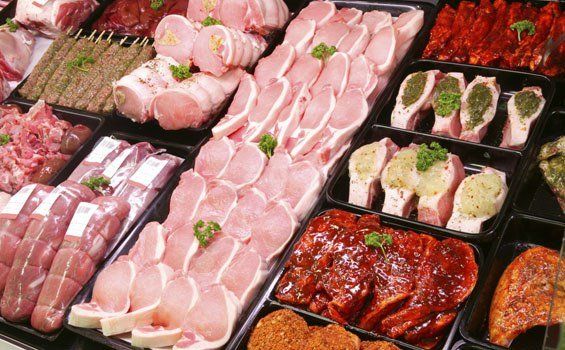Why Shopping at a Neighborhood Meat Market Guarantees Fresh, High-Quality Cuts
Shopping at a regional meat market offers distinct benefits that typically go unnoticed by consumers accustomed to larger retail chains. These markets provide direct accessibility to fresh, high-quality cuts, an outcome of lessened transportation time from ranch to respond to. This not only improves taste however also supports neighborhood farmers, cultivating area connections and lasting methods. Furthermore, rigorous top quality control measures ensure that each acquisition satisfies high requirements of security and freshness (bagley meat market edwardsville il). The ramifications of choosing regional prolong beyond immediate advantages, prompting a more detailed examination of what this option absolutely implies for both customers and the regional economic situation.
Advantages of Regional Sourcing
In the realm of food purchase, the advantages of local sourcing stand apart plainly. By buying meat from local markets, customers gain direct access to items that are typically fresher and extra flavorful than those found in larger, business grocery stores. Neighborhood sourcing decreases the time and distance food travels from farm to table, which not just enhances taste but also protects nutritional value.

Furthermore, regional sourcing commonly gives openness concerning the origins of the meat. Consumers can ask concerning the farming methods utilized, animal welfare standards, and whether the meat is natural or grass-fed. This info equips customers to make educated decisions aligned with their values.
Quality Control Standards
Regional meat markets frequently stick to strenuous quality control criteria that guarantee the items supplied meet high safety and security and freshness criteria. These requirements normally encompass different phases of the meat manufacturing procedure, from sourcing to taking care of and storage.
First, regional markets often establish strict distributor criteria, making sure that only respectable farms and manufacturers are utilized - bagley meat market edwardsville il. This decreases the possibility of contamination and promotes higher animal well-being criteria. In addition, numerous neighborhood meat markets implement regular examinations to confirm that the meat is refined under hygienic problems, further decreasing health and wellness threats
Temperature level control is an additional crucial aspect of quality assurance. Regional meat markets often monitor refrigeration systems to preserve ideal storage space temperature levels, making sure that meat remains secure and fresh for intake. The application of traceability systems allows markets to track the origin of their items, providing openness and liability.
Finally, personnel at local meat markets are usually educated to acknowledge signs of wasting and understand correct handling techniques. This commitment to quality control not just elevates the overall criterion of the meat however additionally cultivates consumer trust fund, making local meat markets a dependable source for premium cuts.
Supporting Neighborhood Farmers
Supporting regional farmers is vital for promoting a sustainable food system and boosting area resilience. When customers choose to patronize neighborhood meat markets, they straight add to the livelihoods of farmers in their region. This not just supports the regional economic climate but additionally enhances the farming field, guaranteeing that it continues to be vivid and viable.


Furthermore, supporting neighborhood farmers fosters a sense of community and link in between consumers and producers. It motivates transparency in food sourcing and imparts trust fund, as consumers can develop partnerships with the people that elevate their food. This straight connection eventually results in a more engaged and informed public, which is vital for supporting for lasting farming practices in the future.
Sustainable Practices
Sustainable methods in meat markets play a crucial role in advertising ecological stewardship and ensuring animal well-being. Local meat markets often focus on sourcing their items from ranches that apply moral and sustainable farming approaches. These methods consist of rotational grazing, which assists keep soil health and wellness and decreases carbon emissions, alongside lessening using anti-biotics and hormonal agents in animals.
Additionally, regional meat markets commonly stress openness in their supply chains. Clients are offered with information pertaining to the origin of their meat, allowing them to make enlightened options that align with their worths. By supporting regional farmers who exercise sustainable methods, next page customers add to the preservation of biodiversity and the reduction of transport emissions linked with long-distance meat distribution.
Furthermore, numerous local meat markets take part in waste reduction strategies, such as using every component of the animal and advertising off-cuts that might or else go unsold. By cultivating a much more lasting approach to meat intake, these markets not only give high-quality items but likewise add positively to the environment their explanation and pet welfare. In essence, purchasing at a local meat market straightens customers with a more comprehensive motion in the direction of responsible and moral food sourcing.
Individualized Client Solution
Shopping at a meat market commonly incorporates more than simply the items offered; it is also concerning the experience and the connections developed in between customers and staff. Personalized client solution is a characteristic of local meat markets, setting them in addition to larger grocery chains. Experienced team put in the time to comprehend specific consumer choices, ensuring that each go to is customized to particular demands.
Consumers profit from experienced advice on cuts, food preparation approaches, and prep work ideas, cultivating a feeling of trust fund and commitment. This personalized interaction allows customers to ask questions and look for referrals, bring about educated getting choices. Personnel participants commonly bear in mind routine clients and their preferences, producing a welcoming atmosphere that grows area ties.
Moreover, individualized service extends to unique requests, such as custom cuts or specific preparation approaches, which larger sellers might not fit. This level of attention reinforces the dedication of neighborhood meat markets to top quality and client fulfillment.
Fundamentally, individualized customer support not just enhances the purchasing experience however also makes certain that clients leave with the ideal products matched to their cooking needs, making every browse through a satisfying one.
Conclusion
Supporting regional farmers cultivates community connections and enhances the regional economic situation, while lasting techniques contribute to environmental stewardship. Furthermore, individualized client solution improves the shopping experience, making local meat markets a preferred choice for consumers seeking both top quality and ethical factors to consider in their food sourcing.
The effects of picking neighborhood expand past immediate benefits, prompting a closer exam of what this selection really suggests for both consumers and the local economy.
Sustaining neighborhood meat markets likewise adds to the local economic situation. Neighborhood meat markets often keep track of refrigeration systems to pop over to this site maintain optimal storage temperature levels, making certain that meat stays fresh and risk-free for consumption.Local farmers are often extra attuned to the certain needs of their areas, expanding plants and elevating animals that line up with neighborhood tastes and choices. Supporting regional farmers fosters community partnerships and enhances the neighborhood economy, while lasting practices add to environmental stewardship.